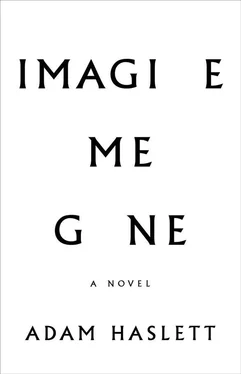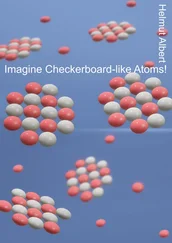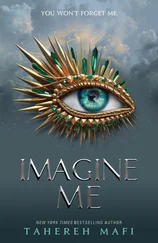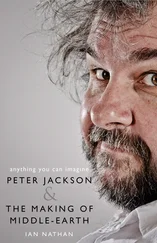We didn’t talk about his visit once he’d gone. I presume she told my father about it, but not in my presence. It would have happened eventually, the revelation of her partialness, that she might need something, that her need could be a burden, but it came so suddenly and so starkly. I forgave her everything I had ever blamed her for and tried to love her more without saying anything. She lives on her own now in a pleasant market town outside Southampton, in a comfortable little brick-house development that my brother found for her. To the children she is Granny with the good dark chocolates and the strict table manners. She will blame Margaret.
“You didn’t say if I should ask for the raise,” Alec says.
And in my children’s eyes, how long have I been partial? How long have I been a burden?
“Why not?” I say, but my words have no life to them, and he knows it.
His cake has arrived and is already gone. He scrapes at the last smudges of icing. “Mom said you were better.”
His straight brown hair falls at a slant across his brow. I could reach over the table now and touch the top of his downturned head. The beast is a projector too, every day throwing up before me pictures of what I’m incapable of.
The little agony of stillness is ended by the appearance in the diner of a boy whose name I should know; he’s one of Alec’s friends — Scott or Greg or Peter. I’m facing the door so I see him first. He waves and comes over to our booth. Like most of Alec’s friends, he’s dressed in dark, secondhand clothing — a black suit jacket and paisley shirt, both several sizes too large. When they’re together they look like a group of young hobos. If it’s meant as some kind of class transvestism it doesn’t much work; the air of the costume gives it rather the opposite effect, of boy actors affecting a pose. He and Alec greet each other with elaborate nonchalance. Yet I notice Alec is blushing. Something about the moment is making him nervous. He trips over a question about whether Scott or Greg or Peter is getting together later with others, and the boy, who’s greeted me with an upward nod of the chin, as if he and I were convicts meeting in the yard, replies to Alec with what I think he means to be a sardonic comment, but which instead comes off as a mixture of daffy and cruel. It’s a reference I can’t follow, about someone being lame.
He perches on the banquette beside Alec, who looks most uncomfortable now. They’re like harlequins, the two of them, young and droopy-faced and strange. As a little boy Alec would wake me from my naps by climbing up on the bed and rocking back and forth until I grabbed him and pulled him down on top of me, and then I’d take a coin and grasp it in my fist and he’d use both hands to try to pry my thumb loose and get at it, and everything between us then seemed as I thought having children would be, and as it had never quite been with Michael. I want to break Alec back down to that, to wipe away all this tentative foolery, just for today. And say what to him? Do what? If I ever had the care of his soul, I don’t anymore. I gave it up ten times over by not getting out of bed, by lingering in the basement and letting him find me there, staring at a wall. I may have been all he knew for a time but he’s been old enough for a couple of years now to measure me against others. My trousers don’t fit me. I have to cinch my belts to the last notch. Soaping myself in the bath, I can feel the softness of my flesh where my muscles once were.
“I’m going record shopping with Brad,” Scott or Greg or Peter says; he’s ordered a milk shake without asking if we are staying, and sucks on it noisily. Alec’s desire to go off with him on his expedition is all the more obvious for how he tries to hide it, saying Michael’s probably already got whatever albums they’re looking for. But if he didn’t have to go back to work shortly, he’d be out the door with him. At their age, I wore a blue uniform and spent my idle time avoiding the cruelty of prefects. Excitement was the purchase of candy at the tuckshop. They have more merchandise in their rooms than we had in our house. Still, I’m glad he knows nothing of that world. I pay at the cash register, wave good-bye to the owner, and eventually Alec and his friend trail after me onto the blazing sidewalk.
My family will never know how they saved me. Margaret, maybe, but not the children. When I turn back Alec is looking almost beseechingly at his friend, who seems oblivious to the attention he’s receiving, as he kicks a pebble down the pavement, loping with an ostentatiously casual gait, the cartoon of a rock star, all flounce and droop. I have the passing urge to visit upon him some deprivation to see how his elaborate manner would fare in less bountiful circumstances but more than being angry at this little customer, I realize that what I really want is for Alec to stop paying him such mind. After we’ve passed the town hall, he finally takes his leave, and Alec walks up beside me again, reluctant and clearly deflated as we climb the hill back to the grocery store.
“Remind me who that was.”
“Sam,” he says, sounding practically disconsolate now. All this is wrong. Our time can’t end like this. “Come on,” I say, “let’s walk.”
“My break’s over. They’ll get mad at me.”
“I’ll tell them — I’ll explain it.” I’m already leading him to the other side of the street, the cars halting to let us cross. The sun burns directly above, the buildings giving no cover. I don’t know where we are going. Shards of light from the glass and steel of parked cars burn at my eyes. A little farther on we reach the footpath that shadows the brook — a strip of parkland winding through the town behind backyards and playing fields. I head onto it, making for the shade. I’ve never adapted to the climate here. Summer is an oppression.
“What are we doing?” Alec says.
He’s trailing many steps behind me now. I think that of all of them, he will manage the best. His born selfishness. His impatience. The way we spoiled him. I stop and wait for him to catch up.
“My break’s over,” he says again, pausing a couple of yards away, kicking lightly at the grass. “I have to go. What are we doing here, anyway? Why’d you come to the store?”
“I wanted to see you.”
“Why are you acting so weird?” he says. “Can’t you just stop?”
There is nothing I can say to him now that isn’t murder. But I have to try. “Sam — he seems like a nice fellow,” I say, though I don’t believe it. It’s just that Alec will have friends, and I want him to know that. People he can rely on. People to spend time with.
“What are you talking about? You don’t even know who he is. Just stop, please, will you?” He looks as mortified as if the two of us were onstage together naked.
I can see in his eyes how hard he’s trying not to pity me. This is what I do to them. Over and over. And then, like Alec’s face now, their faces become the mask of the beast, used by it to torment me. My voice used to protect Alec, the way I invented stories for him. Protecting him from the ghosts. Now I’m the spirit trapped in his house.
He’s turning to go, upset and fed up. I walk over to him, to put a hand on his shoulder, but he ducks out from under my touch and hurries back up to the street.
The deepest shade is beneath a maple further along the path. I lean up against it, sitting on the grass. The water of the brook is clear to the sandy bed. These beauteous forms / Through a long absence, have not been to me / As is a landscape to a blind man’s eye / But oft, in lonely rooms, and ’mid the din / Of towns and cities, I have owed to them / In hours of weariness, sensations sweet… That first time I went into hospital, during university, I remember being glad Mr. Gillies had made us memorize poems at school … that blessed mood / In which the burthen of the mystery / In which the heavy and the weary weight / Of all this unintelligible world / Is lighten’d — that serene and blessed mood / In which the affections gently lead us on, — / Until the breath of this corporeal frame / And even the motion of our human blood / Almost suspended, we are laid asleep / In body, and become a living soul. The words meant nothing to me as a boy. They were just a rhythm. Jumbled up with Gilbert and Sullivan and “Onward Christian Soldiers.” But after the treatments, I would come back to my room bruised across the chest from my convulsions against the restraints, and for several days I wouldn’t be able to recall much of anything except passages of music and those stanzas. They became the way I measured time. By bringing back that earlier world, assuring me it had existed, and thus that when more time passed things might be different still. And so I began to piece together the meaning of the phrases. That the motion of our blood could almost stop, our bodies be laid to sleep, but somehow the soul be kept alive. Simply by the things we saw and heard, in any given moment. It was a report from the inside of another person’s head, someone who’d been in lonely rooms, who’d lived through hours of weariness but knew a path back to life. Which is what I found then. Returning to my college, being with friends, having happiness. I’d seen the monster, but I didn’t recognize it because I was young and had never encountered it before. Why should I think I ever would again?
Читать дальше












